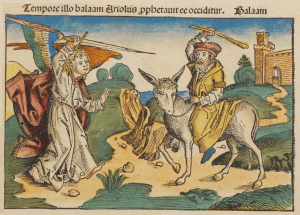Posts Tagged ‘Balaam’
BALAK 5774
Posted on: July 1, 2014

This sidra, named Balak after a king of Moab, concerns the more famous Balaam, a pagan prophet and magician who was recruited by King Balak to curse the Israelites. Why did Balak want the Israelites cursed? Well, like Pharaoh in the time of Moses, he felt threatened by a population increase among the Israelites. Balak planned to contain this by getting a reliable and renowned sorcerer to pronounce a curse and stop the demographic expansion.
Archaeological evidence points to a real sorcerer called Balaam son of Beor. An inscription dated to around the eighth century BCE and unearthed in a part of Jordan, which would correspond with Moab, refers to Balaam bar Beor, a visionary. This fragment of an ancient plaster wall was discovered during an excavation in 1967. The eighth century is later than the events in the Wilderness described in our Torah reading, but it shows that Balaam’s name was known and associated with magic.
Balaam’s story in the bible is particularly memorable because he has a talking ass, who sees an angel as they travel to the court of King Balak. The ass opens her mouth to complain when Balaam strikes her with his staff. Then Balaam sees the angel, who tells him to proceed to Moab, but speak only the words which God will put in his mouth. Seeing an angel is probably less surprising than having a talking ass.
In the chapter which we’re going to read, Balaam has arrived at Bamoth-Baal, the high plateau where the Moabites worship their gods and, from there, he can see the encampment of the Israelites spread out below. Balaam tells the king that he requires seven altars, seven bulls and seven rams, which are provided.
God then appears to Balaam and tells him what to say. Balaam utters the first of his oracles – an oracle is a prophetic saying – in which he praises Israel and says ‘How can I curse whom God has not cursed?’
Balak is dismayed but doesn’t give up and tries moving Balaam to another high place, where seven more altars are constructed and more bulls and rams sacrificed.
Balaam then speaks again, a beautiful poem in which he says, ‘I received a command to bless: God has blessed, and I cannot revoke it.’
Twice more, Balak moves Balaam around, installing the requisite altars and supplying the livestock for sacrifice. Each time, Balaam looks upon the Israelite tents below and speaks the benedictions which God puts into his mouth. He says: ‘Mah tovu ohelecha Yaacov, mishkenotecha Yisrael!’ How good are your tents O Jacob, your dwelling places, O Israel.
Yes, these words come from a celebrated pagan sorcerer Balaam, hired by a Moabite king to curse Israel. After delivering the oracles, Balaam goes home, presumably on the same ass as before, and Balak gives up on cursing the Israelites.
Balaam’s oracles are full of archaic language and words uncommon in biblical use. Some scholars believe that these poems predate the narrative, the Balaam story, but there are other opinions, which see in them allusions to later events. Nobody knows.
Balaam has an afterlife in post-biblical writings. He is much discussed in rabbinic literature, mentioned by Josephus and Philo and alluded to in the New Testament and the Qur’an. Midrash offers a divided view, sometimes referring to Balaam as a great gentile prophet and sometimes calling him ‘the wicked Balaam,’ based on another story in the book of Numbers, where Balaam is a subversive figure, inciting the Israelites to idolatry.
Commentators have made a connection between Balaam’s story and Abraham’s role in the binding of Isaac, in Genesis 22. Balaam rose early and saddled his ass taking with him two servants. The same is said of Abraham. Balaam sets out in defiance of God’s command while Abraham journey is an act of extraordinary obedience. An angel appears to Balaam and, reversing the previous commandment, tells him to proceed on his journey to Moab. A heavenly voice calls to Abraham and tells him not to carry out the commandment but to lay no hand on Isaac.
The Akedah narrative ends with the words ‘So Abraham returned to his young men, and they arose and went together to Beersheba. And Abraham lived at Beersheba’. Balaam’s narrative ends: Then Balaam rose and went back to his place. And Balak also went his way.’
Balaam uses certain names of God: Shaddai and Elyon, which are not the most usual names. On the whole, it’s the Patriarchs who call God El Shaddai, God Almighty, and after the Patriarchs, in the Pentateuch, it’s only Balaam who uses it. The name Shaddai appears also on the Balaam inscription found in Jordan. God tells Moses, ‘I appeared to Abraham, Isaac and Jacob as El Shaddai.’ But to Moses He makes himself known by a different name. Regarding the name El Elyon, the Most High God, we hear it in Genesis when we learn that Melchizedek, who blesses Abraham, is the priest of El Elyon.
As for Balak, the Moabite king who plays straight man to Balaam and his talking ass, he is a descendant of Lot, Abraham’s nephew. You may recall how Lot’s narrative was interwoven with that of Abraham. Although that’s another story; it sheds light on the sidra of Balak, Abraham’s distant relation and a descendant of Terach, Abraham’s father.
So maybe the bible’s telling us: you can choose life, but you can’t choose your relations.
GL 5 July 2014